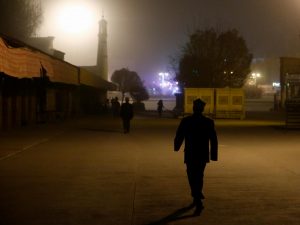Muslims in China say they are being told to hand over Qurans or face ‘harsh punishments’

Men walk to the Id Kah Mosque for morning prayers in Kashgar, Xinjiang Uighur Autonomous Region, China, in March 2017 REUTERS
Chinese authorities are ordering Muslims in the country to hand over their prayer mats and copies of the Quran or else face punishment, it has been reported.
Officials in Xinjiang province have warned members of the Uyghur ethnic minority they must surrender religious items on pain of “harsh punishments”, according to an exile leader.
“We received a notification saying that every single ethnic Uyghur must hand in any Islam-related items from their own home, including Qurans, prayers and anything else bearing the symbols of religion,” Dilxat Raxit, of the exile World Uyghur Congress, told Radio Free Asia (RFA), which is operated by the US government.
The directive also applies to ethnic Kazakh and Kyrgyz Muslims, RFA said. It was reportedly announced via the WeChat social network.
In its update on China in 2016 and 2017, Amnesty International said the communist Beijing government “continued to violate the right to freedom of religion, and crack down on all unauthorised religious gatherings” in the region, and to detain Uyghur writers.
Tension between Uighurs and Han Chinese boiled over in 2009, leading to violence that left scores dead.
Hundreds of people have died in the protracted conflict between separatists and the Chinese government in the Xinjiang Uyghur Autonomous Region, its full name, which sits on China’s far north-western border.
Beijing has blamed the problems on Islamist militants, though rights organisations say the violence is in reaction to repressive Chinese policy. Rebels claim the region has been illegally occupied since 1949.
Peaceful protests have taken place alongside bombings and other violent attacks on Chinese security forces and institutions.




 Print
Print Email
Email